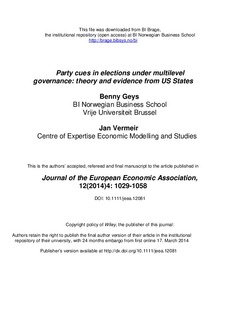| dc.contributor.author | Geys, Benny | |
| dc.contributor.author | Vermeir, Jan | |
| dc.date.accessioned | 2014-07-11T09:20:14Z | |
| dc.date.accessioned | 2014-10-03T08:55:01Z | |
| dc.date.available | 2014-07-11T09:20:14Z | |
| dc.date.available | 2014-10-03T08:55:01Z | |
| dc.date.issued | 2014 | |
| dc.identifier.citation | Journal of the European Economic Association, 12(2014)4: 1029-1058 | nb_NO |
| dc.identifier.issn | 1542-4766 | |
| dc.identifier.issn | 1542-4774 | |
| dc.identifier.uri | http://hdl.handle.net/11250/222910 | |
| dc.description | This is the authors’ accepted, refereed and final manuscript to the article. The final publication is available at www.elsevier.com | nb_NO |
| dc.description.abstract | In federal countries, voters’ ability to evaluate the performance of their leaders might be reduced when different levels of government shape policy outcomes. This can blur political accountability.
In this article, we analyze how party cues (i.e., politicians’ party membership acting as a cue towards their characteristics) affect voters’ incomplete information in a federal setting.We theoretically show that party cues allow indirect inference regarding politicians using observed policy outcomes, and can alleviate the accountability problem. Empirical evidence from US presidential election results
across all 50 US states over the period 1972–2008 supports this proposition. However, party cues also
have a downside in that they may reduce politicians’ effort, particularly when politicians at different
levels of government are from different parties. | nb_NO |
| dc.language.iso | eng | nb_NO |
| dc.publisher | Wiley | nb_NO |
| dc.title | Party Cues in Elections under Multi-Level Governance: Theory and Evidence from US States | nb_NO |
| dc.type | Journal article | nb_NO |
| dc.type | Peer reviewed | nb_NO |
| dc.date.updated | 2014-07-11T09:20:15Z | |
| dc.source.journal | Journal of the European Economic Association | nb_NO |
| dc.identifier.doi | 10.1111/jeea.12081 | |
| dc.identifier.cristin | 1051588 | |
| dc.description.localcode | 2, Forfatterversjon | nb_NO |
